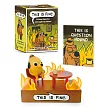「這本書將促使你重新思考對美好生活的想像。透過深刻的見解和易懂的文字,保羅.布倫針對痛苦和磨難作為幸福的要素,提供了引人入勝的解說。這部作品是對抗毒性正能量,一劑令人振奮的解藥。」
──暢銷書《給予》作者亞當.格蘭特
受苦受難、挫折感滿滿……這些負面感受,居然是幸福的重要元素!?耶魯大學心理學教授保羅.布倫,帶來一本令人眼睛為之一亮的作品,向讀者揭示,為何承受痛苦,是帶來愉悅和生命意義的重要來源。
觀賞讓人流淚或恐懼的電影、吃辛辣的食物、泡溫度高到有點燙人的熱水浴、跑馬拉松……仔細想想,這些舉動都有些違背常理,為何我們會願意去做帶來身體或情緒上痛苦的事?
運用心理學和腦科學的突破性發現,本書指出,一些正向的「受苦」,能帶來更高強度的愉悅感。痛感可以分散我們的焦慮,並幫助我們突破極限;恐懼與悲傷的情緒,則是我們沉浸在戲劇或奇幻故事的樂趣的一部份,能夠提供一些道德上的滿足感;而努力、掙扎,在對的情境下,則能引領我們找到掌握技藝、沉浸在專注忘我狀態的喜悅。
受苦也扮演著更深層的角色。我們並非天生的享樂主義者──所謂「美好的生活」,包含了愉悅感以外的事物。人們尋找人生的意義、與他人的連結和能帶來成就感的追求,而這些,或多或少都讓人必須經歷掙扎、焦慮、和失去。透過本書,布倫以文字描繪了真正屬於「幸福」的滋味:甜蜜,又帶點苦味和酸澀,就像一道層次豐富的料理,讓人回味無窮。(文/博客來編譯)
"This book will challenge you to rethink your vision of a good life. With sharp insights and lucid prose, Paul Bloom makes a captivating case that pain and suffering are essential to happiness. It’s an exhilarating antidote to toxic positivity." --Adam Grant, #1 New York Times bestselling author of Think Again and host of the TED podcast WorkLife
One of BehavioralScientist’s"Notable Books of 2021"
From the author of Against Empathy, a different kind of happiness book, one that shows us how suffering is an essential source of both pleasure and meaning in our lives
Why do we so often seek out physical pain and emotional turmoil? We go to movies that make us cry, or scream, or gag. We poke at sores, eat spicy foods, immerse ourselves in hot baths, run marathons. Some of us even seek out pain and humiliation in sexual role-play. Where do these seemingly perverse appetites come from?
Drawing on groundbreaking findings from psychology and brain science, The Sweet Spot shows how the right kind of suffering sets the stage for enhanced pleasure. Pain can distract us from our anxieties and help us transcend the self. Choosing to suffer can serve social goals; it can display how tough we are or, conversely, can function as a cry for help. Feelings of fear and sadness are part of the pleasure of immersing ourselves in play and fantasy and can provide certain moral satisfactions. And effort, struggle, and difficulty can, in the right contexts, lead to the joys of mastery and flow.
But suffering plays a deeper role as well. We are not natural hedonists--a good life involves more than pleasure. People seek lives of meaning and significance; we aspire to rich relationships and satisfying pursuits, and this requires some amount of struggle, anxiety, and loss. Brilliantly argued, witty, and humane, Paul Bloom shows how a life without chosen suffering would be empty--and worse than that, boring.



 天天爆殺
天天爆殺  今日66折
今日66折 



























 博客來
博客來 博客來
博客來 博客來
博客來 博客來
博客來 博客來
博客來